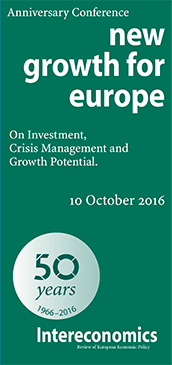INTERECONOMICS – REVIEW OF EUROPEAN ECONOMIC POLICY
|
The September/October issue of Intereconomics covers a wide range of topics that vary from the value of utility theory in modern economics to the diverging fortunes in the European manufacturing industry. This issue's Forum tackles the inescapable issue of Brexit, where a diverse group of researchers attempt to make sense of the UK’s decision and predict a path forward – in the absence of any real guidance from the UK or the EU on the matter. Elsewhere, our Editorial looks at the ever-increasing gulf separating Turkey from the EU, and our Letter from America examines the economic policies of the US presidential candidates in a campaign that has been more personality-driven than policy-based. We invite you to join us in Berlin on 10 October for our 50th anniversary conference, titled New Growth for Europe – On Investment, Crisis Management and Growth Potential. Presenters include Tito Boeri, Daniel Gros, Karl Whelan, Clemens Fuest, László Andor and many other top European economists. We are also proud to announce our annual conference at the Centre for European Policy Studies in Brussels on 3 November. This year's conference is titled Inefficient Inequality: The Economic Costs of Gender Inequality in Europe. We invite you to join us in what promises to be a fascinating discussion, featuring Diane Perrons, Joana Perreira, Stephen Klasan and many more experts on the topic. Please follow us on Twitter at @intereconomics_ for updates, events and interesting economic findings. |
50th Anniversary Conference
New Growth for Europe
Conference on Gender Inequality
The Economic Costs of Gender Inequality in Europe
Much attention is given to the existence and measurement of gender inequality, but relatively little attention is given to the macroeconomic costs that result from the presence of inequality. At this conference, researchers, policy-makers, and business representatives will discuss the costs and inefficiencies that result from gender inequality. What are potential solutions? What policies need to be implemented, and at which level? Register for the conference here.
Featured Topic
The Post-Brexit European Union
The European project has never suffered a setback like the UK’s decision to Brexit, and questions over the very future of the project must be asked in the wake of this reality in which one of the EU’s major powers has decided to opt out. By looking through the lens of the economic and legal framework that exists between the UK and the EU, we can explore the possible future relationship between the two actors and perhaps better understand how they grew apart. This Forum examines Brexit from a variety of angles, ranging from London’s status as the financial centre of Europe to intra-EU migration to the very future of the European project.
Additional Highlights from the Current Issue
The US Presidential Candidates and the Economy
While it is sometimes difficult to remember that policy is actually relevant in the current US presidential campaign, whoever wins the vote in November will grab the reigns of the world's biggest economy for the next four years. Leonard Burman attempts to make some sense of what a Donald Trump or Hillary Clinton presidency would look like from an economic policy point of view.
New Models of Economic Integration for Turkey and the UK
Turkey's relationship with Europe is broken. The ultimate goal of accession that had underpinned this relationship has lost both its relevance and its credibility. Sinan Ãlgen predicts what sort of relationship is possible between the two in the future. Surprisingly enough, he argues that the UK’s secession from the EU may actually strengthen Turkey’s bargaining position with the European Union.
Quote of the Month
|
|
|
|
from Paul De Grauwe's Forum article What Future for the EU After Brexit?
About Intereconomics – Review of European Economic Policy
Intereconomics is jointly produced by ZBW – Leibniz Information Centre for Economics and the Centre for European Policy Studies (CEPS). The journal appears bimonthly and features papers by economists that deal with economic and social policy issues and trends in Europe or affecting Europe. To submit a paper for publication, please visit the Submissions section of our website for relevant information.
Intereconomics is published by Springer-Verlag Berlin Heidelberg.
Newsletter Subscription
To unsubscribe from the newsletter, please visit the following web page, enter your email address, and click "unsubscribe": http://archive.intereconomics.eu/newsletter.php.
To change your email address, please unsubscribe as explained above and then resubscribe using your new address.
Editorial Office
Intereconomics
ZBW – Leibniz Information Centre for Economics
Neuer Jungfernstieg 21
20354 Hamburg, Germany
Phone: +49 (0)40 42834-306/307
Fax: +49 (0)40 42834-262
intereconomics@zbw.eu
and
Centre for European Policy Studies (CEPS)
Place du Congrès 1
1000 Brussels, Belgium
Phone: +32 (0)2 229 39 11
Fax: +32 (0)2 219 41 51
intereconomics@ceps.eu


